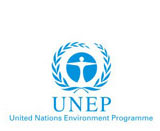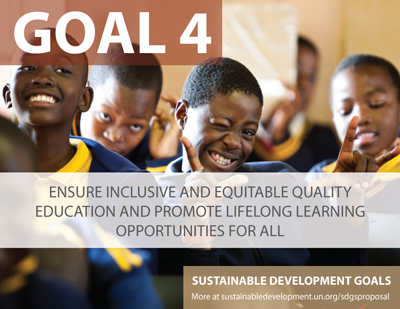|
| Workshop Partners |
|
Working Group discussing Goal 4.4 “By 2030, substantially increase the number of youth and adults who have relevant skills, including technical and vocational skills, for employment, decent jobs and entrepreneurship”
Today, we have the largest generation of young people the world has ever known. One third of them live in countries that have suffered a violent conflict, 75 million are unemployed, and political representation is systematically much older, in all regions of the world, than the society it represents. In other words, the institutional public space is scarce for young men and women; if war was a tragedy for all, peace is difficult for them and jobs are hard to get and tough to keep. The young generations have made their voices heard loud and clear about the future they want. In the Post-2015 Consultations, they have demanded, more than anything else, education, jobs, honest and responsive governments, and greater and meaningful participation in decision-making. Their views must count.” - Magdy Martínez-Solimán, Director a.i. Bureau for Policy and Programme Support, UNDP1
Rights and Responsibilities are two major aspects of Youth Empowerment. When young men and women understand their rights, they can become empowered to engage in civil society, public service and political processes, at all levels. They need to know the channels through which they may exercise their civil and political rights and contribute to decision-making processes that impact their lives. Channels for engagement include formal political processes such as youth advisory boards at local level, youth parliaments or shadow councils at national level, and engagement with United Nations processes at the global level, for example. Other entry points include volunteerism, access to civil service positions and decision-making processes in the public administration, initiatives for transparency and accountability, promotion of human rights, legal reform, support for youth organizations, policy review and use of media, including social media, to increase access to information and collect and report on relevant data.
While rights empower youth on an individual level and lead to knowledge, learning about their responsibilities and role as equal and responsible global citizens lead to action. Education for Sustainable Development (ESD) plays a major role in informing youth about these responsibilities and inspiring them to take action and have a larger impact towards the sustainability of our planet.
The workshop focussed on discussing the rights and responsibilities of youth as global citizens from the context of ESD and what role an empowered youth can play in achieving SDG’s. The Global discussions of youth forums like the United Nations Major Group for Children and Youth (UNMGCY) or other international youth groups working on this and the opinions of young leaders from these forums on SDG’s during international consultations were shared with the participants to give them a brief insight into the discussions on Sustainable Development leading up to the international conference, to help them understand the current global scenario, and come up with their own interventions and suggestions to feed into and further enrich the process.
Emphasis was also on Sustainable Livelihoods, as per Target 4.4 of the Sustainable Development Goals, which is to substantially increase the number of youth and adults who have relevant skills, including technical and vocational skills, for employment, decent jobs and entrepreneurship by 2030. By giving importance to discussion on livelihood generation and promoting Entrepreneurship among youth, the aim was to build capacity of youth and further prepare them to take up leadership roles in terms of Sustainable Development and ESD globally.
Workshop Sessions
Session |
Time |
Event |
Details |
Day 1- |
2:30-3:30 p.m. |
Opening plenary
|
• Introduction and Welcome of Speakers |
|
3:30-4:00 p.m. |
Formation of groups for |
Introduction to recommendation drafting committee Moderators to divide groups based on themes
|
Session II |
5:00- 6:00 p.m. |
Participation of Youth in Decision making Facilitation: Varun Jhaveri, Kritika Chauhan Martand Shardul, Representative |
Group Discussion in Working Groups Presentation of ideas |
Day 2- |
11:15 a.m.-12:15 p.m. |
Session on Youth and Entrepreneurship |
Introduction of Session |
|
12:15-1:15 p.m. |
Working Group Discussion on Sustainability focussed Start-ups |
Group Discussion in Working Groups |
Session IV |
2:30 |
Working Group Discussions Contd. Facilitated by: Varun Jhaveri, Martand Shardul, Representative |
|
|
3:00 |
Presentation of start-up |
. |
Day 3- |
9:30 |
Youth Success Stories Facilitated by: Varun Jhaveri, Martand Shardul, Representative |
Exhibition and Discussions |
Session VI |
11:15 a.m. |
Finalizing the Outcome document Facilitated by: Varun Jhaveri, Martand Shardul, Representative |
|









